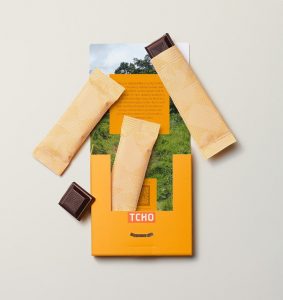Some chocolate makers are dipping a toe into plant-based chocolate, launching a couple of products alongside their current lines or offering items in a test market to see how consumers respond.
In contrast, California-based Tcho is diving into the space with gusto. As of today, it is transitioning all of its retail chocolate bars to be 100 per cent plant-based. By late 2022, all of the chocolate it makes for professional bakers will be too. The entire product line will be plant-based by 2023.
Because of this change, Tcho will move toward ending its existing bars made with dairy. It’s launching six new plant-based varieties as its product lineup. Essentially, Tcho is completely reinventing itself.
“What we’re doing, in moving away from our entire current line and then rolling out these six new bars, is kind of crazy,” said Josh Mohr, Tcho’s vice president of marketing. “But we feel like that dedication, that commitment to transition to be animal-free by 2023 is definitely where we need to go.”
Tcho decided to make this change in keeping with the company’s ethos of ethical and sustainable chocolate. And, Mohr said, a big part of the reason that the company is making a full transformation to plant-based is that it wants to give the new chocolate the greatest chance for success. It doesn’t want to add one plant-based option that may or may not be picked up by retailers or consumers.

Products no longer in production include the toffee + sea salt, mokaccino and toasted cornflake bars. In their place will be toffee time, choco latté, born fruity, holy fudge, dark duo and aww nuts, which can be purchased on Tcho’s website. The company’s chocolates that are already dairy-free — hawt chocolate drinking chocolate, sweet and sassy and dark and bitter baking chocolate, super powder cocoa powder and crush this roasted cocoa nibs — will stay in distribution and be rebranded.
Brad Kintzer, Tcho’s head chocolate maker, has been working on the company’s redevelopment for about three years. Chocolate taste, quality, sustainability and nutrition were all top of mind as he went into the massive reformulation. After all, plant-based chocolate is a growing segment, but some new options haven’t gone over well with consumers. Kintzer said the bad reviews other confectioners’ plant-based options received were actually an inspiration, and removing all of the dairy from Tcho’s high-end chocolate bars constituted the “ultimate challenge.” Trying to solve this challenge, he said, the company went through hundreds of different combinations to find the best ones. Solving this challenge involved going through hundreds of different ingredient combinations to find the best ones.
“We’ve just been having a lot of fun discovering the plant world, and how much you can really do from a flavor perspective, from a texture perspective,” Kintzer said. “And when we realized that we could actually make something that we were proud of, it sort of became this question, Why wouldn’t we switch?”
Making chocolate even better
Kintzer said he started by deconstructing milk chocolate. Why do people love it? The cocoa flavor, the creaminess, the softer texture and the natural caramel flavor make it a favorite treat, he said.
He wanted to reimagine that experience using other ingredients — and improve chocolate’s health profile, using less sugar if possible. From the beginning, he knew he wouldn’t be able to make simple replacements. He also knew that different ingredient combinations would taste different in Tcho’s craft chocolate, which showcases the natural flavors of cacao cultivated in various parts of the world.
Kintzer found a combination of three ingredients that could create the plant-based chocolate he was hoping for – oat milk, cashew butter and coconut sugar. Kintzer wanted to work with oat milk because of its sustainability, texture and trendiness, and was able to find an especially creamy and clean-tasting variety. The cashew butter added the softer texture chocolate consumers are used to, plus a delicate and sweet taste. After adding the cashew butter, Kintzer found he didn’t need the same amount of sugar. The coconut sugar also supplied a bit of the caramel taste that is often present in dairy chocolate.
Mohr said that as he tasted the new products, he had an entirely new experience in the realm of chocolate. “The creaminess, the softness and the carameliness. But in the way that it’s composed, once we tasted that trifecta, there was nothing that we could describe that it reminded us of,” Mohr said. “So it is almost like we’re delivering the best of milk chocolate, but in a whole new way.”

photo Tcho
Tcho formulated the new bars to make its dairy-free chocolate flavors and methods truly shine, Kintzer said. The company has added a new system that allows for a subtle sort of filling, which is featured in new bars like dark duo, which uses Tcho’s single-origin chocolate from both Ghana and Peru. It has also doubled down on using nuts as an ingredient in Tcho’s new Aww Nuts bar, which features an almond butter filling.
A sweet future
Tcho is a company with a strong ethical compass. Its chocolates are organic and Fair Trade Certified. Tcho has long partnered with its cacao farmers across the world, working to both pay them a living wage and give them the tools they need to grow and cultivate quality chocolate. By 2018 through the Tcho Source program, the company established 10 global flavor labs in Ecuador, Peru, the Dominican Republic and Ghana, so the growers and workers could taste the chocolate they grow and work to improve yields and flavor locally.
In September, Tcho became a Certified B Corp, which recognizes the company’s measures in terms of sustainable sourcing and practices. That makes right now an even better time to completely switch to plant-based, Mohr said — Tcho is ready for a comprehensive rebrand.
The new, fully recyclable packaging for the chocolate is brightly colored and made from recycled materials. The chocolate is wrapped in three individual-sized portions. And there’s more storytelling on the packaging about the company and the Tcho Source program.
Mohr and Kintzer both think that the move toward plant-based will be well received by Tcho’s regular consumers and chocolate lovers alike. Tcho has been studying its consumer patterns in conjunction with SPINS, and Mohr found one statistic in particular to be striking. Almost half of regular Tcho consumers who purchased a different high-end chocolate brand picked up one that was plant-based.
“It kind of really put us on the edge in terms of, ‘All right, we’ve got something here. Let’s go for it,’ ” Mohr said.
IndiFoodBev — authentic, impactful and influential
An English-language food and beverage processing and packaging industry B2B platform in print and web, IndiFoodBev is in its third year of publication. It is said that the Indian food and beverage industries represent approximately US$ 900 billion in revenues which implies more than 20% of the country’s GDP. Eliminating the wastage on the farmside can help to deliver more protein to a higher number of the population apart from generating sizable exports. The savings in soil, seeds, water, fertilizer, energy and ultimately food and nutrition could be the most immense contribution that country is poised to make to the moderation of climate change.
To improve your marketing and grow sales to the food and beverage processing and packaging industry, talk to us. Our research and consulting company IppStar [www.ippstar.org] can assess your potential and addressable markets in light of the competition. We can discuss marketing, communication, and sales strategies for market entry and growth.
Suppliers and service providers with a strategy and budget for targeted marketing can discuss using our hybrid print, web, video, and social media channels to create brand recognition linked to market relevance. Our technical writers are ready to meet you and your customers for content.
The second largest producer of fruit and vegetables in the world is continuously expanding processing capacities and delivery systems with appropriate innovative technologies. We cover product and consumer trends, nutrition, processing, research, equipment and packaging from farm to thali. Get our 2025 media kit and recalibrate your role in this dynamic market. Enhance your visibility and relevance to existing markets and turn potential customers into conversations. Ask for a sample copy of our bi-monthly in print or our weekly IndiFoodBev eZine each Wednesday.
For editorial info@ippgroup.in — for advertisement ads1@ippgroup.in and for subscriptions subscription@ippgroup.in
Naresh Khanna – 10 February 2025
Subscribe Now












